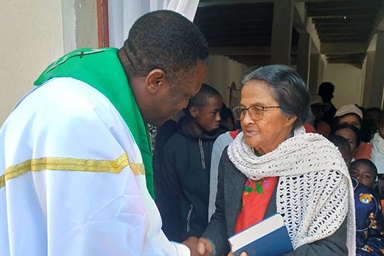An item meant to offer convenience to new parents has turned into an environmental headache in Zimbabwe.
As people have adopted the use of diapers as an alternative to napkins, or cloth diapers, used diapers have become an eye sore and environmental hazard in the country’s urban centers and areas nearby cities, according to Africa University professor Zanele Furusa.
“Zimbabwe is not yet ready for the use and disposal of diapers,” she said, noting the country’s lack of incinerators.
Furusa, a lecturer in the Faculty of Humanities and Social Sciences and wife of Africa University Vice Chancellor Munashe Furusa, spoke to more than 20,000 women in the Zimbabwe Episcopal Area at their annual Ruwadzano Rwe Wadzimai conventions, large camp meeting revivals held over two weekends earlier this month. She told them that disposal diapers are a convenience, but also a major cause of pollution in both urban and some rural areas.
“For the time being, we need to explore alternatives, such as going back to using napkins, until such a time we are able to dispose (of) them with no further damage to the environment.”
She challenged institutions to use ingenuity to come up with contextualized technologies in the area of waste management and sustainability.
“In my back yard in Mutare, I woke up to some shocking development, as neighbors were piling up these diapers behind my perimeter wall … Water was flowing to where the piling garbage was, leading downstream,” Furusa said.
The problem of uncollected refuse in most of the country’s urban centers is contributing to the accelerated degradation of the environment.
“Rural communities at the peripheries of city centers are at the receiving end due to the polluted rivers…,” she said, referring to ongoing studies.
Proposed interventions
Furusa implored the church as citizens and stewards to take full responsibility for waste management in their own back yards.
“In the Book of Genesis, God gave dominion to humanity … yet we the custodians continue unabated to defile the land God blessed us with…,” she said.
Garbage piling up at dumps is stripping away Mutare’s beauty and splendour, she said, bemoaning the status quo where people live in clean houses but are not mindful of dirty surroundings.
“Acknowledgement of the environmental crisis is the starting point towards the building blocks for a habitable planet,” Furusa said.
She called on individuals present at the conventions to share the vision for a cleaner environment.
“This presentation is in line with our desire as an organization to be at par with the sustainable development goals…,” said Greater Nhiwatiwa, president of Ruwadzano Rwe Wadzimai, “and having such presentations during our annual conventions is of great importance.”
Pastors also were called upon to work with church leadership to promote the “teach one to reach one” campaign, an advocacy program in which individuals and communities influence each other to make a difference for the environment.
“Advocacy for our communities and beyond through the ‘teach one to reach one’ initiative will be a viable tool for intervention,” Furusa said.
Sorting trash at the source, processing waste correctly and adopting the idea of “reduce, reuse, recycle” also are good starting points, she said.
“We need our own communities to come up with home-grown initiatives for our God-given niches so as to make sure every community is covered.”
Africa University clean-up campaign
Through its initiatives, Africa University has managed to implement waste management on campus and beyond.
Five roadside drum refuse bins were placed along the roads that flank Africa University. In addition, staff and students participated in clean-up campaigns in collaboration with City of Mutare leadership and residents, local high schools, the Environmental Management Agency (EMA) Mutare, police and several environmental groups.
Fifteen additional bins were made in collaboration with Mutare Board and Doors, a local company supporting the initiative. Four were donated to United Methodist Church headquarters at the women’s annual conference and the other 11 have been planted on campus.
Maforo is a pastor and communicator in the Zimbabwe Episcopal Area.
News media contact: Vicki Brown, [email protected] or 615-742-5472.
Like what you're reading? Support the ministry of UM News! Your support ensures the latest denominational news, dynamic stories and informative articles will continue to connect our global community. Make a tax-deductible donation at ResourceUMC.org/GiveUMCom.





